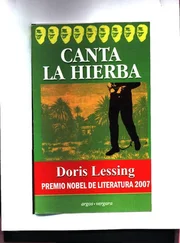This links improbably with a fact: I was brought up in what was virtually a mud hut, thatched. This kind of house has been built always, everywhere there are reeds or grass, suitable mud, poles for walls. Saxon England for example. The one I was brought up in had four rooms, one beside another, and it was full of books. Not only did my parents take books from England to Africa, but my mother ordered books by post from England for her children. Books arrived in great brown paper parcels, and they were the joy of my young life. A mud hut, but full of books.
Even today I get letters from people living in a village that might not have electricity or running water, just like our family in our elongated mud hut. “I shall be a writer too,” they say, “because I’ve the same kind of house you lived in.”
But here is the difficulty, no?
Writing, writers, do not come out of houses without books.
There is the gap. There is the difficulty.
I have been looking at the speeches by some of your recent prizewinners. Take the magnificent Pamuk. He said his father had five hundred books. His talent did not come out of the air, he was connected with the great tradition.
Take V. S. Naipaul. He mentions that the Indian Vedas were close behind the memory of his family. His father encouraged him to write, and when he got to England he would visit the British Library. So he was close to the great tradition.
Let us take John Coetzee. He was not only close to the great tradition, he was the tradition: he taught literature in Cape Town. And how sorry I am that I was never in one of his classes, taught by that wonderfully brave, bold mind.
In order to write, in order to make literature, there must be a close connection with libraries, books, with the Tradition.
I have a friend from Zimbabwe, a black writer. He taught himself to read from the labels on jam jars, the labels on preserved fruit cans. He was brought up in an area I have driven through, an area for rural blacks. The earth is grit and gravel; there are low sparse bushes. The huts are poor, nothing like the well-cared-for huts of the better off. A school—but like one I have described. He found a discarded children’s encyclopedia on a rubbish heap and taught himself from that.
On Independence in 1980 there was a group of good writers in Zimbabwe, truly a nest of singing birds. They were bred in old Southern Rhodesia, under the whites—the mission schools, the better schools. Writers are not made in Zimbabwe. Not easily, not under Mugabe.
All the writers traveled a difficult road to literacy, let alone to becoming writers. I would say learning to read from the printed labels on jam jars and discarded encyclopedias was not uncommon. And we are talking about people hungering for standards of education beyond them, living in huts with many children—an overworked mother, a fight for food and clothing.
Yet despite these difficulties, writers came into being. And we should also remember that this was Zimbabwe, conquered less than a hundred years before. The grandparents of these people might have been storytellers working in the oral tradition. In one or two generations there was the transition from stories remembered and passed on, to print, to books. What an achievement.
Books, literally wrested from rubbish heaps and the detritus of the white man’s world. But a sheaf of paper is one thing, a published book quite another. I have had several accounts sent to me of the publishing scene in Africa. Even in more privileged places like North Africa, with its different tradition, to talk of a publishing scene is a dream of possibilities.
Here I am talking about books never written, writers that could not make it because the publishers are not there. Voices unheard. It is not possible to estimate this great waste of talent, of potential. But even before that stage of a book’s creation which demands a publisher, an advance, encouragement, there is something else lacking.
Writers are often asked, How do you write? With a word processor? an electric typewriter? a quill? longhand? But the essential question is, Have you found a space, that empty space, which should surround you when you write? Into that space, which is like a form of listening, of attention, will come the words, the words your characters will speak, ideas—inspiration.
If a writer cannot find this space, then poems and stories may be stillborn.
When writers talk to each other, what they discuss is always to do with this imaginative space, this other time. “Have you found it? Are you holding it fast?”
Let us now jump to an apparently very different scene. We are in London, one of the big cities. There is a new writer. We cynically enquire, Is she good-looking? If this is a man, charismatic? Handsome? We joke but it is not a joke.
This new find is acclaimed, possibly given a lot of money. The buzzing of paparazzi begins in their poor ears. They are feted, lauded, whisked about the world. Us old ones, who have seen it all, are sorry for this neophyte, who has no idea of what is really happening.
He, she, is flattered, pleased.
But ask in a year’s time what he or she is thinking—I’ve heard them: “This is the worst thing that could have happened to me,” they say.
Some much-publicized new writers haven’t written again, or haven’t written what they wanted to, meant to.
And we, the old ones, want to whisper into those innocent ears: “Have you still got your space? Your soul, your own and necessary place where your own voices may speak to you, you alone, where you may dream. Oh, hold onto it, don’t let it go.”
My mind is full of splendid memories of Africa which I can revive and look at whenever I want. How about those sunsets, gold and purple and orange, spreading across the sky at evening. How about butterflies and moths and bees on the aromatic bushes of the Kalahari? Or, sitting on the pale grassy banks of the Zambesi, the water dark and glossy, with all the birds of Africa darting about. Yes, elephants, giraffes, lions and the rest, there were plenty of those, but how about the sky at night, still unpolluted, black and wonderful, full of restless stars.
There are other memories too. A young African man, eighteen perhaps, in tears, standing in what he hopes will be his “library.” A visiting American seeing that his library had no books, had sent a crate of them. The young man had taken each one out, reverently, and wrapped them in plastic. “But,” we say, “these books were sent to be read, surely?” “No,” he replies, “they will get dirty, and where will I get any more?”
This young man wants us to send him books from England to use as teaching guides.
“I only did four years in senior school,” he says, “but they never taught me to teach.”
I have seen a teacher in a school where there were no textbooks, not even a chalk for the blackboard. He taught his class of six- to eighteen-year-olds by moving stones in the dust, chanting “Two times two is…” and so on. I have seen a girl, perhaps not more than twenty, also lacking textbooks, exercise books, biros, seen her teach the ABCs by scratching the letters in the dirt with a stick, while the sun beat down and the dust swirled.
We are witnessing here that great hunger for education in Africa, anywhere in the Third World, or whatever we call parts of the world where parents long to get an education for their children which will take them out of poverty.
I would like you to imagine yourselves somewhere in southern Africa, standing in an Indian store, in a poor area, in a time of bad drought. There is a line of people, mostly women, with every kind of container for water. This store gets a bowser of precious water every afternoon from the town, and here the people wait.
The Indian is standing with the heels of his hands pressed down on the counter, and he is watching a black woman, who is bending over a wadge of paper that looks as if it has been torn from a book. She is reading Anna Karenin .
Читать дальше
Конец ознакомительного отрывка
Купить книгу











